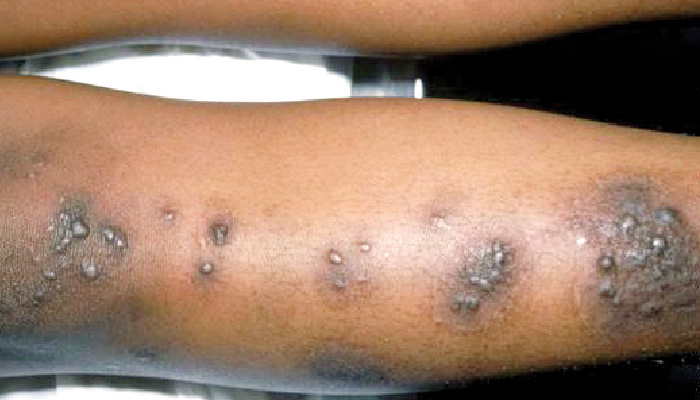
Eczema, a skin condition that causes dry and itchy patches on the skin can significantly impact the quality of life and affect both the physical and emotional health of those with the condition, dermatologists said.
They said though not contagious, Eczema, which is a type of dermatitis – a group of conditions that cause skin inflammation, often affects children, adolescents and adults.
The professionals said as simple as it may sound, eczema weakens the skin’s barrier function responsible for moisture retention and protection from outside elements.
They, however, held that knowing the dermatitis type and adopting the right treatment option will alter any negative impact it might have on a patient’s life.
A Dermatologist at the Nnamdi Azikiwe University Teaching Hospital, Dr. Fred Johnson, said the human skin is made up of an outer layer, called the epidermis, a middle layer (dermis) and an inner layer (subcutaneous layer).
He explained that the outer layer has different layers of protection against certain eczema-causing bacteria, which are the basal, spinous or prickle-cell, and the corneal or horny layer.
Dr. Johnson said the corneal layer, which is the visible part of the skin, protects the body from germs and renews itself constantly as new cells grow from the basal layer.
He, however, said in people with eczema, the corneal layer does not provide enough protection because it is damaged by an inflammatory response occurring in the skin.
The dermatologist noted that eczema can be caused by a mix of environmental and genetic factors and that irritants found in soaps and surface cleaners, for example, can trigger the immune system, causing inflammation that may present as eczema flare-ups.
According to him, a mutated gene, which affects the production of the protein filaggrin needed by the body to make the skin’s outer layer, is also responsible.
He said in a situation where filaggrin is not enough, the balance of fats in the skin changes, causing it to lose moisture.
“This, therefore, provides less protection from irritants, allergens and germs that might cause infections because the skin is damaged. The skin may also be irritated by environmental factors or other substances that are not allergens, including in situations where rough fabrics come in contact with the skin, cigarette smoke and extreme heat or cold.
“The risk of developing eczema is mostly hereditary. However, studies have not shown that anything can effectively prevent it. But research so far suggests that only dietary supplements containing probiotic bacteria might have a preventive effect.”
A Consultant Public Health Physician at Havana Hospital, Lagos, Dr. Ngozi Obiora, was of the opinion that eczema appears on the body of people that are dirty and lack good personal hygiene.
She, however, said some types are hereditary and need certain pharmaceutical ointments to get them off the skin periodically.
Speaking on how eczema impacts life, another dermatologist and a physician with the General Hospital Ogidi, Anambra State, Dr. Michael Egwuonu, said the skin condition can have both physical and emotional effects on people with it.
He noted that the itch from eczema can be severe and can make concentration quite difficult, while also making the person with the skin condition feel embarrassed.
“People with moderate to severe disease report that itchy eczema disturbs their sleep and others say it affects their relationships. Patients and their families may experience considerable emotional distress because of people’s responses to this illness.
“Care providers and families can also suffer psychosocial stress and anxiety over the affected member. Depression and anxiety are more common in people with eczema, especially when they see their peers’ bodies without eczema. People often stare at them and refuse to share personal effects with them,” he said.
Dr. Egwuonu said by taking good care of the skin, using medications and avoiding irritants, among other triggers for eczema, there could be a relief to the symptoms.
According to research by the National Library of Medicine, published on its website, the prevalent rate of eczema among children is 15% globally, but only two to four per cent occurs in adults.
The research indicated that breastfeeding possibly lowers the risk of eczema to a certain degree but did not state why a child can develop eczema because there are many different factors involved.
Meanwhile, regarding the causes of eczema, the study stated that they are not completely understood.
Nevertheless, despite this uncertainty, the World Health Organisation recommends that women breastfeed their babies for the first six months of life and then offer them solid foods and breast milk.
“This is because breastfeeding strengthens the bond between mother and child and offers other health benefits for babies: it lowers the risk of some infectious diseases,” WHO stated.
Recognising neglected skin diseases, WHO published a training guide to make it easier for health workers to identify the signs and symptoms of neglected tropical diseases of the skin and other common skin conditions through their visible characteristics.
According to WHO, skin diseases are among the most common of all human health afflictions and affect almost 900 million people in the world.
The Medical Officer, Department of Control of Neglected Tropical Diseases, Dr. Kingsley Asiedu, who led the project, said five common conditions account for over 60 per cent of all skin diseases.
“This training guide is meant for front-line health workers who do not have a thorough knowledge of common skin diseases and the support that WHO has to provide for all and to everyone, everywhere.
“It is possible to identify the most common skin diseases as their treatment is simple, with many responding to medication that is widely available.
“The guide is part of WHO’s efforts to combine control, treatment and care activities for skin-related diseases to maximise the use of limited resources and expand treatment coverage. Skin examination offers an opportunity to screen people and to identify multiple conditions in a single visit.
“An integrated approach in communities and schools can potentially reduce costs and cut down delays in diagnosis as well as promote skin health for all,” the guide stated.
The Coordinator of Innovative and Intensified Disease Management Unit, Department of Control of Neglected Tropical Diseases, Dr. Daniel Dagne, said targeted tropical skin disease also provides an integrated platform for improved detection and treatment of common skin conditions in communities and, therefore, has wider public health benefits.
He noted that the success of the integrated approach depends on well-trained health workers and community volunteers who can correctly identify multiple skin conditions.
Research by the National Library of Medicine indicates that eczema usually starts during the first two years of life, adding that some children can also develop eczema later.
It stated that a rash starting on a baby’s scalp may be an early sign, but doesn’t necessarily mean that the child would develop eczema.
“Further cause of eczema depends on the age at which it develops, among other factors. Children who develop eczema under the age of 12 months often grow out of it relatively quickly: Only half of them will still have it after three years.
“Eczema is often more persistent in children who develop it between the ages of two and five years. It is estimated that eczema goes away again within 10 years in more than 80% of all affected children, and within 20 years in up to 95%,” the research stated.
On treatment options, a Pharmacist and the Managing Director, Malgoz Pharmaceutical Ltd, Satellite Town, Lagos, Ophili Chigozie, said using certain pharmaceutical products, especially ointment regularly after taking a shower will help in clearing eczema.
He noted that taking showers with warm water is encouraged as it helps to ward off certain skin diseases.
The pharmacist urged people to wear loose-fitting clothes made of cotton and other natural materials, wash new clothing before wearing, avoid wool or synthetic fibres, and to also keep off irritants and allergens that can trigger eczema.





